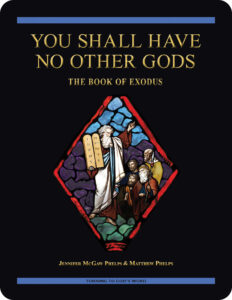 You Shall Have No Other Gods:
You Shall Have No Other Gods:
The Book of Exodus
Lesson 17 The Ten Commandments
the book of Exodus 20:1–26
Revised Standard Version Catholic Edition (RSVCE)*
New American Bible Revised Edition (NABRE)*
Catechism of the Catholic Church
ex libris (in our library)
glossary for the book of Exodus
cross references in the book of Exodus
next lesson: Practical Application of the Law of the Covenant
This material coordinates with Lesson 17 on pages 82–85 in the study book You Shall Have No Other Gods: The Book of Exodus.
And God spoke all these words, saying, ‘I am the LORD your God, who brought you out of the land of Egypt, out of the house of bondage. You shall have no other gods before me. You shall not make for yourself a graven image, or any likeness of anything that is in heaven above, or that is in the earth beneath, or that is in the water under the earth; you shall not bow down to them or serve them; for I the LORD your God am a jealous God, visiting the iniquity of the fathers upon the children to the third and the fourth generation of those who hate me, but showing mercy to thousands of those who love me and keep my commandments.”—the book of Exodus 20:1–6
welcome to our in-depth study of the book of Exodus
We invite interested groups and individuals to check out the sample first lesson from this 28- lesson Turning to
lesson Turning to  God’s Word Catholic Bible study. These online study pages link to our free lesson video overviews, as well as to a glossary and cross references in the biblical text. Other study aids include maps, additional commentary, and prayers based on the primary Scripture in each lesson. You Shall Have No Other Gods: The Book of Exodus has been granted an imprimatur and can be purchased from our website shop. If you have a Bible-study question or comment, click on one of the “ask us your question” or “what do you think” buttons on any online study page.
God’s Word Catholic Bible study. These online study pages link to our free lesson video overviews, as well as to a glossary and cross references in the biblical text. Other study aids include maps, additional commentary, and prayers based on the primary Scripture in each lesson. You Shall Have No Other Gods: The Book of Exodus has been granted an imprimatur and can be purchased from our website shop. If you have a Bible-study question or comment, click on one of the “ask us your question” or “what do you think” buttons on any online study page.
open with prayer
It’s always wise to begin any Bible study with prayer, whether reading the Scriptures alone or meeting with others in a discussion group. You can pray using your own words or use one of the opening prayers on our website. We especially like the following:
Lord Jesus, you promised to send your Holy Spirit to teach us all things.
As we read and study your word today,
allow it to touch our hearts and change our lives. Amen.
let’s review—the book of Exodus 19:1–25
Lesson 16 God Speaks to Moses on the Mountain, though often overlooked, represents a significant event in the Old Testament, at least from the perspective of present-day Christians. The LORD offers to expand the covenant he previously made and renewed with their ancestors—Abraham, Isaac, and Jacob—to now include all of the descendants of Jacob. Although the Israelites readily agree when Moses poses this idea, the biblical text suggests that they really aren’t so willing to be in a covenant relationship with God. It’s fine if the LORD’s willing to rescue them from their enemies, but they aren’t crazy about serving the LORD, which is the flip side of the agreement they enter. Moses, who so far has been serving as God’s prophet, ends up acting as the go-between for the LORD and the people.
 which ranks first—the law or the priesthood? (01:37:43)
which ranks first—the law or the priesthood? (01:37:43)
In the twentieth chapter in the book of Exodus , the LORD gives his people the  essential elements of the law in the form of the Ten Commandments, and God does this through Moses. In this video, Turning to God’s Word author Matthew Phelps explains details about what law is, with special focus on law backed up by the authority of God. The LORD’s action establishes several things that are important for Christians to keep in mind. First, the lawgiver is more important than the priest. (Moses is more important than Aaron.) Although Aaron hasn’t yet been named high priest, most people
essential elements of the law in the form of the Ten Commandments, and God does this through Moses. In this video, Turning to God’s Word author Matthew Phelps explains details about what law is, with special focus on law backed up by the authority of God. The LORD’s action establishes several things that are important for Christians to keep in mind. First, the lawgiver is more important than the priest. (Moses is more important than Aaron.) Although Aaron hasn’t yet been named high priest, most people  remotely familiar with the book of Exodus know where the story is headed. Second, which follows from the first, following the law is more important than following ritual practices and ignoring the law. The third important consideration is brought out in the third chapter in the New Testament Letter to the Hebrews, which strongly states that Jesus Christ is more glorious (and therefore is more important) than Moses.
remotely familiar with the book of Exodus know where the story is headed. Second, which follows from the first, following the law is more important than following ritual practices and ignoring the law. The third important consideration is brought out in the third chapter in the New Testament Letter to the Hebrews, which strongly states that Jesus Christ is more glorious (and therefore is more important) than Moses.
The Scripture ranges for the videos that accompany this Catholic Bible study from Turning to God’s Word match the Scripture ranges for the sets of questions in You Shall Have No Other Gods: The Book of Exodus. You can follow along as Turning to God’s Word author Matthew Phelps discusses Lesson 17, “The Ten Commandments,” on pages 82–85 in the study book.
read the Catechism—the LORD is serious about the Ten Commandments
While it’s become common in some religious circles to discredit certain of the Ten Commandments, this 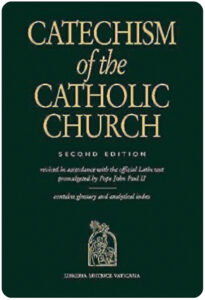 flies in the face of Church teaching. Paragraph 2068 in the Catechism of the Catholic Church is clear that Christians are required to take seriously every one of the Ten Commandments.
flies in the face of Church teaching. Paragraph 2068 in the Catechism of the Catholic Church is clear that Christians are required to take seriously every one of the Ten Commandments.
2068 The Council of Trent teaches that the Ten Commandments are obligatory for Christians and that the justified man is still bound to keep them; the Second Vatican Council confirms: “The bishops, successors of the apostles, receive from the Lord … the mission of teaching all peoples, and of preaching the Gospel to every creature, so that all men may attain salvation through faith, Baptism, and the observance of the Commandments.”
what Matthew says—keeping the Commandments isn’t all that’s needed for salvation
The third chapter in the Letter to the Galatians uses harsh language to insist on the necessity of works 
 done in faith, but the idea that Christianity does away with the need for the law is discredited. Paul discusses the place of the law at length in the Letter to the Romans 2:12–13: “All who have sinned without the law will also perish without the law, and all who have sinned under the law will be judged by the law. For it is not the hearers of the law who are righteous before God, but the doers of the law who will be justified.” Paul’s point is that the law does far more to condemn than to save. Finding a different pathway to salvation doesn’t nullify the obligation to observe the Commandments. In the video,however, Turning to God’s Word author Matthew Phelps points out that the people receiving the law from God already have been damned. The purpose of the Ten Commandments isn’t to punish people. The commandments introduce the idea of life, suggesting that there’s a way to create a relationship with God that leads out of death and into life.
done in faith, but the idea that Christianity does away with the need for the law is discredited. Paul discusses the place of the law at length in the Letter to the Romans 2:12–13: “All who have sinned without the law will also perish without the law, and all who have sinned under the law will be judged by the law. For it is not the hearers of the law who are righteous before God, but the doers of the law who will be justified.” Paul’s point is that the law does far more to condemn than to save. Finding a different pathway to salvation doesn’t nullify the obligation to observe the Commandments. In the video,however, Turning to God’s Word author Matthew Phelps points out that the people receiving the law from God already have been damned. The purpose of the Ten Commandments isn’t to punish people. The commandments introduce the idea of life, suggesting that there’s a way to create a relationship with God that leads out of death and into life.
 read the Catechism—a large portion is devoted to the Commandments
read the Catechism—a large portion is devoted to the Commandments
The importance that the Church places on following the Commandments can be seen in the amount of space given to them in the Catechism of the Catholic Church. The Ten Commandments as found in the twentieth chapter in the book of Exodus (and in the fifth chapter in the book of Deuteronomy)are reprinted after paragraph 2051 in the Catechism of the Catholic Church. Anyone interested in learning more about Catholic moral teaching will find much to think about in the following paragraphs.


 An introduction to the Ten Commandments can be found beginning with paragraph 2052 through paragraph 2082 in the Catechism of the Catholic Church. The first three Commandments, which deal with love of God, are discussed beginning with paragraph 2083 through paragraph 2195. The next seven Commandments deal with love of neighbor and are the focus of moral teaching beginning with paragraph 2196 through paragraph 2557 in the Catechism.
An introduction to the Ten Commandments can be found beginning with paragraph 2052 through paragraph 2082 in the Catechism of the Catholic Church. The first three Commandments, which deal with love of God, are discussed beginning with paragraph 2083 through paragraph 2195. The next seven Commandments deal with love of neighbor and are the focus of moral teaching beginning with paragraph 2196 through paragraph 2557 in the Catechism.
why it matters that Moses becomes a mediator
So far in the book of Exodus, the people have not shown much interest in worshiping the LORD or even in honoring God for all that’s been done on their behalf. In the book of Exodus 20:18–19, they suddenly figure out that the LORD they’ve been taking for granted is all-powerful. The LORD isn’t like the ineffectual gods of Egypt. When God descends on the mountain in a great show of power and strength, the Israelites properly are frightened. This should be the normal reaction of any humans who encounter the LORD. The Israelites’ reaction in this section of the book of Exodus is a very big deal. They have the chance to speak directly with God from the base of the mountain, and they decline. Instead, they insist on having Moses serve as a mediator. This can be understood as a case of the people choosing a lesser path than God is offering, and taking the lesser path will lead to issues later.
the double duties of priests
Moses’ action on behalf of the people anticipates a future problem for the Israelites. Even though God hasn’t yet named Aaron and his descendants as priests, Moses is required to step in and fulfill part of the duties of a priest. In addition to offering sacrifice, priests also are expected to mediate for the people with God and for God with the people. In order to be effective as a mediator, a person needs to have a close relationship with the LORD. Moses has developed such a relationship. At this point in the book of Exodus, it’s clear that Aaron hasn’t. What’s unclear is whether Aaron ever will.
the mountain definitely still matters
The mountain in the wilderness continues to serve as an image of the spiritual life. Present-day Christians who wish to develop a relationship with God still need to make a serious effort to do so. One way our faith reflects what God tells Moses in the book of Exodus 20:25–26 can be seen in the altars in our churches. Although in the present day these are made from stone that’s almost always hewn stone, they’re deliberately raised to symbolize going up the mountain to meet God.
sabbath—you could look it up in our archives
Although the book of Genesis 2:1–3 establishes the seventh day as a day of rest, in the book of Exodus 20:8, God  reiterates the importance of his people observing that day as a day of rest when in the third of the Ten Commandments the LORD specifies that they do so. To learn more about the word “sabbath” and how Jesus viewed the sabbath rest, read Lost in Translation, an online column in which Turning to God’s Word author Matthew Phelps helps readers connect with ideas expressed in the original languages of the Scriptures. New Lost in Translation entries are posted on Mondays, and past entries are archived on our website. Contact us if you’d like to receive Lost in Translation by email every week.
reiterates the importance of his people observing that day as a day of rest when in the third of the Ten Commandments the LORD specifies that they do so. To learn more about the word “sabbath” and how Jesus viewed the sabbath rest, read Lost in Translation, an online column in which Turning to God’s Word author Matthew Phelps helps readers connect with ideas expressed in the original languages of the Scriptures. New Lost in Translation entries are posted on Mondays, and past entries are archived on our website. Contact us if you’d like to receive Lost in Translation by email every week.
what Matthew says—when did monotheism start?
The title for this Catholic Bible study is taken from the book of Exodus 20:3 (RSVCE): “You shall have no other  gods before me” [“You shall not have other gods beside me” (NABRE)]. This verse is cited in the commentary, “The Possibility of Other Gods,” on page 84 of this lesson in You Shall Have No Other Gods: The Book of Exodus. Turning to God’s Word author Matthew Phelps points out that while the RSVCE AND NABRE translations are basically the same, the translation of a related verse in the Torah seems open to interpretation. The book of Deuteronomy 6:4 (RSVCE) records: “Hear, O Israel: The LORD our God is one LORD” [“Hear, O Israel! The LORD is our God, the LORD alone!” (NABRE)]. At the very least, this suggests the possibility of the idea that God is one being established early in the Torah.
gods before me” [“You shall not have other gods beside me” (NABRE)]. This verse is cited in the commentary, “The Possibility of Other Gods,” on page 84 of this lesson in You Shall Have No Other Gods: The Book of Exodus. Turning to God’s Word author Matthew Phelps points out that while the RSVCE AND NABRE translations are basically the same, the translation of a related verse in the Torah seems open to interpretation. The book of Deuteronomy 6:4 (RSVCE) records: “Hear, O Israel: The LORD our God is one LORD” [“Hear, O Israel! The LORD is our God, the LORD alone!” (NABRE)]. At the very least, this suggests the possibility of the idea that God is one being established early in the Torah.
Most scholars believe that this great prayer of the Hebrews (known as the Shema) in the book of Deuteronomy was written down roughly the same time as the portion of the Book of Isaiah (the fortieth through fifty-fifth chapters) thought to reflect the words of the prophet known as Deutero- (Second) Isaiah. While the works attributed to Deutero-Isaiah are believed to have been written just prior to the time that the Israelites were about to return to Judah from the Babylonian Exile (the prophet was active from 550 to 530 B.C.), the Exodus from Egypt is thought to have occurred at least seven and possibly as many as ten centuries earlier. The events described in the book of Exodus and in the other four books of the Torah generally are accepted by scholars as having been passed down orally during the long period of time before they were consigned to writing.
 For more information about Deutero-Isaiah, see Lesson 7 Deutero-Isaiah Proclaims the End of the Exile and Lesson 8 God’s Suffering Servant, both in the Turning to God’s Word Catholic Bible study Thus Says the LORD: God Speaks Through His Servants the Prophets—Volume II: Restoration & Redemption.
For more information about Deutero-Isaiah, see Lesson 7 Deutero-Isaiah Proclaims the End of the Exile and Lesson 8 God’s Suffering Servant, both in the Turning to God’s Word Catholic Bible study Thus Says the LORD: God Speaks Through His Servants the Prophets—Volume II: Restoration & Redemption.
ex libris—one God is a reasonable idea
In Light of the World: The Pope, the Church, and the Signs of the Times, an extended interview with 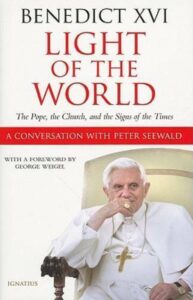 Pope Benedict XVI
Pope Benedict XVI  by writer Peter Seewald, the former pope discusses an idea expressed during the Babylonian Exile: “Our God is not one or another of many; he is the Creator; the God of heaven; the one God. … [T]his core concept later became a meeting place between the Old Testament and Greek civilization. For at approximately the same time as the Babylonian exile singled out in particular this feature of the Old Testament, Greek philosophy also developed, which now
by writer Peter Seewald, the former pope discusses an idea expressed during the Babylonian Exile: “Our God is not one or another of many; he is the Creator; the God of heaven; the one God. … [T]his core concept later became a meeting place between the Old Testament and Greek civilization. For at approximately the same time as the Babylonian exile singled out in particular this feature of the Old Testament, Greek philosophy also developed, which now  looked beyond the gods and inquired about the one God.” At ex libris—main bookshelf, you can read excerpts and learn more about Light of the World and other works related to Catholic Bible study.
looked beyond the gods and inquired about the one God.” At ex libris—main bookshelf, you can read excerpts and learn more about Light of the World and other works related to Catholic Bible study.
t he best Catholic commentary about Scripture
he best Catholic commentary about Scripture
To find out more about how Church teaching is supported by Scripture passages in You Shall Have No Other Gods: The Book of Exodus, check out the Index of Citations in the Catechism of the Catholic Church. Links (Revised Standard Version Catholic Edition [RSVCE*]) to the primary Scripture passages in the lesson and relevant paragraphs in the Catechism are provided here. Not every passage in the biblical text for this Catholic study is referenced in a Catechism paragraph, however.
the book of Exodus 20:1–17—paragraph 2056
the book of Exodus 20:2—paragraph 2061
the book of Exodus 20:2–5—paragraph 2083
the book of Exodus 20:7—paragraph 2141
the book of Exodus 20:8–10—paragraph 2167
the book of Exodus 20:11—paragraphs 2196, 2200, 2214
the book of Exodus 20:13—paragraph 2257
the book of Exodus 20:14—paragraph 2330
the book of Exodus 20:15—paragraph 2400
the book of Exodus 20:16—paragraphs 2463, 2504
the book of Exodus 20:17—paragraphs 1456, 2513, 2533
ways our glossary might prove helpful
In addition to providing extra information about geographical locations, our glossary also points out  when a person or place is mentioned in the biblical text under more than one name or more than one spelling. If you can remember a name but aren’t sure in which lesson it shows up, you can find it in the glossary, which lists every proper noun that appears in the biblical text for every lesson in You Shall Have No Other Gods: The Book of Exodus.
when a person or place is mentioned in the biblical text under more than one name or more than one spelling. If you can remember a name but aren’t sure in which lesson it shows up, you can find it in the glossary, which lists every proper noun that appears in the biblical text for every lesson in You Shall Have No Other Gods: The Book of Exodus.
to learn more, read more Scripture
If you’re having difficulty with a particular passage of Scripture, it can be helpful to read the relevant  cross references—but looking these up can take time. To make that easier, we’ve compiled the cross references from the Revised Standard Version Second Catholic Edition (RSV2CE)—the translation that we reprint in our study books. That list can be found at the top of every online study page accompanying this study, and it includes links to each of the cross references in the primary biblical text for You Shall Have No Other Gods: The Book of Exodus.
cross references—but looking these up can take time. To make that easier, we’ve compiled the cross references from the Revised Standard Version Second Catholic Edition (RSV2CE)—the translation that we reprint in our study books. That list can be found at the top of every online study page accompanying this study, and it includes links to each of the cross references in the primary biblical text for You Shall Have No Other Gods: The Book of Exodus.
don’t forget about our indexes & extra online material

 If you’re trying to locate information about a specific Scripture passage, you can look it up in the index at the back of the study book or sample lesson. If you want to find a particular commentary, you can look up its title in the topics index. To learn more about another book of the Bible for which there’s a Turning to God’s Word study, visit the online study directories to read the commentaries and watch any accompanying videos. Finally, if you have a question or would like to make a comment about any of our studies, you can use one of the “ask us your question” or “what do you think” buttons to email our authors.
If you’re trying to locate information about a specific Scripture passage, you can look it up in the index at the back of the study book or sample lesson. If you want to find a particular commentary, you can look up its title in the topics index. To learn more about another book of the Bible for which there’s a Turning to God’s Word study, visit the online study directories to read the commentaries and watch any accompanying videos. Finally, if you have a question or would like to make a comment about any of our studies, you can use one of the “ask us your question” or “what do you think” buttons to email our authors.
ex libris—Church documents & books about religious topics
Link to magisterial documents referred to in our Bible studies at ex libris—magisterial documents.  This listing includes significant recent encyclicals as well as a number of historical Church documents. Recommended books related to Scripture study can be found at ex libris—main bookshelf.
This listing includes significant recent encyclicals as well as a number of historical Church documents. Recommended books related to Scripture study can be found at ex libris—main bookshelf.
wondering how to pronounce some of these words?
The following link is to a reading from the New International Version (NIV) Bible. To listen, open the link and click on the audio icon above the printed text. Although not taken from the translations used in our study materials, the NIV reading provides an audio guide to pronunciation of words in this lesson’s primary biblical text. A close online version of the translation of the Bible used in Catholic liturgy in the United States as well as an audio guide for daily Mass readings for the current month can be found on the website of the United States Conference of Catholic Bishops (USCCB).
the book of Exodus 20:1–26 (NIV)
 close with Bible-based prayer related to this lesson
close with Bible-based prayer related to this lesson
Many of our Catholic study groups like to conclude their discussions with a prayer based on the scriptural focus of their lesson, and some participants include Scripture-specific prayer in their individual study. If you’re uncomfortable composing your own Bible-based prayers, you can follow our four easy steps. If you prefer, you can use the following short prayer based on this lesson’s text from the book of Exodus.
O God, you gave your people the Law through Moses
in order that they might remain faithful
to the covenant you made with their fathers.
Help us to love and trust the guidance of the Church,
and to be sincere in expecting
that we’ll benefit in mysterious ways
when we make Jesus the center of our lives.
We ask this in the name of Jesus Christ. Amen.
Lesson 18 Practical Application of the Law of the Covenant, the book of Exodus 21:1—23:19
Lesson 16 God Speaks to Moses on the Mountain, the book of Exodus 19:1–25
you also may like our two-part study of the prophets
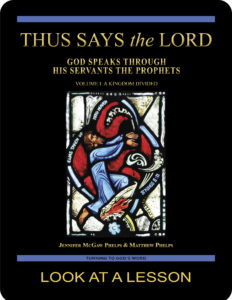
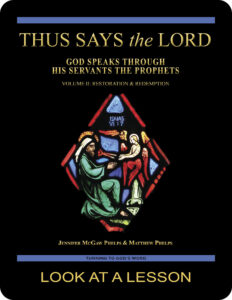 Thus Says the LORD: God Speaks Through His Servants the Prophets—Volume I: A Kingdom Divided examines the prophets in their historical context using the First and Second Books of the Kings and other Old Testament passages written before the Babylonian Exile in 586 B.C. Volume II: Restoration & Redemption looks at the post-exilic prophets. This 51-lesson Catholic Bible study builds on The United Kingdom of Israel: Saul, David & Solomon Foreshadow Christ the King. Click on the books’ covers to view a sample lesson from each volume.
Thus Says the LORD: God Speaks Through His Servants the Prophets—Volume I: A Kingdom Divided examines the prophets in their historical context using the First and Second Books of the Kings and other Old Testament passages written before the Babylonian Exile in 586 B.C. Volume II: Restoration & Redemption looks at the post-exilic prophets. This 51-lesson Catholic Bible study builds on The United Kingdom of Israel: Saul, David & Solomon Foreshadow Christ the King. Click on the books’ covers to view a sample lesson from each volume.
start a Turning to God’s Word Bible study
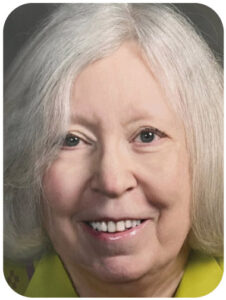 Thank you for your interest in You Shall Have No Other Gods: The Book of Exodus.
Thank you for your interest in You Shall Have No Other Gods: The Book of Exodus.  Information about beginning a Turning to God’s Word Bible study can be found at start a Bible study. Tami, Matthew, and I are available to answer your questions and to offer support. You may use this email to contact us directly if you’re interested in starting a Turning to God study or in having your study schedule listed with other TtGW study groups on our website. —Jennifer
Information about beginning a Turning to God’s Word Bible study can be found at start a Bible study. Tami, Matthew, and I are available to answer your questions and to offer support. You may use this email to contact us directly if you’re interested in starting a Turning to God study or in having your study schedule listed with other TtGW study groups on our website. —Jennifer
*There are seven deuterocanonical books in the Old Testament—the Books of Tobit, Judith, Wisdom, Sirach, Baruch, and First and Second Maccabees, as well as some passages in the Books of Esther and Daniel. Protestants usually refer to these works as “apocryphal,” a word that means “outside the (Protestant) canon” because they’re excluded from most Protestant Bibles. The word “deuterocanonical” means “second canon”; Catholics use that word to refer to any section of the Catholic Old Testament for which there are no extant, or existing, Hebrew manuscripts. All of the deuterocanonical books appear in the Septuagint, the earliest remaining versions of which date to the 1st century B.C. This Greek translation of the Old Testament was in common use by Jews at the time of Jesus—but the same books aren’t found in existing Hebrew manuscripts, which aren’t as old as the oldest version of the Septuagint. Learn more by reading How Do Catholic & Protestant Bibles Differ?
Turning to God’s Word printed Bible studies use the 2006 Revised Standard Version Second Catholic Edition (RSV2CE) translation for all Scripture references except those to the Psalms, which are taken from The Abbey Psalms and Canticles, prepared by the Benedictine monks of Conception Abbey and published in 2020 by the United States Conference of Catholic Bishops (USCCB). All Scripture links for the online study pages for You Shall Have No Other Gods: The Book of Exodus are to the 1966 Revised Standard Version Catholic Edition (RSVCE) translation. The New International Version (NIV) audio recordings follow the same chapter and verse numbering as the RSV Catholic translations, but the NIV translation doesn’t include the deuterocanonical books and passages.
The 1966 RSVCE uses archaic pronouns and verb forms such as “thee,” “thou,” “didst” in the Psalms and in direct quotations attributed to God. The 2006 RSV2CE replaces those with more accessible English. The few significant translation changes in the RSV2CE include rendering almah as “virgin” in the Book of Isaiah 7:14 and restoring the term “begotten” in the Gospel According to John 3:16.
Numbering varies for some passages in this Bible study. Turning to God’s Word studies (print and digital) follow the numbering in the Revised Standard Version Catholic translations (RSV2CE and RSVCE). Discrepancies in the New American Bible Revised Edition (NABRE) are noted in the Index of Scripture Citations in the study book and the online sample.
 You can learn more about the Psalms by viewing a sample lesson from the Turning to God’s Word Catholic Bible study Sing a New Psalm: Communicating with God Through the Prayers of the Church—Volume I: Lauds & Vespers. The second part of that study, Sing a New Psalm: Communicating with God Through the Prayers of the Church—Volume II: Vigils, Day Prayer & Compline, is scheduled for publication in 2025. Some verse numbers may vary in different translations of the Psalms.
You can learn more about the Psalms by viewing a sample lesson from the Turning to God’s Word Catholic Bible study Sing a New Psalm: Communicating with God Through the Prayers of the Church—Volume I: Lauds & Vespers. The second part of that study, Sing a New Psalm: Communicating with God Through the Prayers of the Church—Volume II: Vigils, Day Prayer & Compline, is scheduled for publication in 2025. Some verse numbers may vary in different translations of the Psalms.
